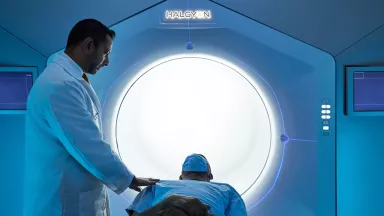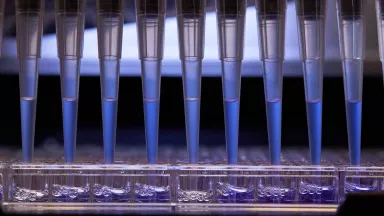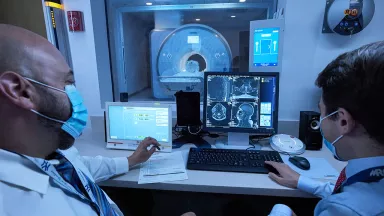Childhood Liver Cancer Treatment
Find exceptional care for children with liver tumors at the Montefiore Einstein Comprehensive Cancer Center at the Children’s Hospital at Montefiore Einstein (CHAM). Here, kids receive state-of-the-art cancer treatment, including surgery, chemotherapy, radiation therapy, liver transplantation and more, from experienced and compassionate cancer specialists.
Ranked in the top 1% of all hospitals in the nation for cancer care according to U.S. News & World Report. CHAM provides exceptional care for children from the New York metropolitan area, across the nation and around the world. In our efforts to provide the best possible care, we’ve assembled an outstanding team of cancer doctors, including world-renowned experts in pediatric liver tumors. In addition, CHAM support staff—dedicated oncology (cancer) nurses and nurse practitioners, social workers, registered dietitians, physical and occupational therapists, fertility specialists (when appropriate) and child life specialists—play an integral role in patient care. Our team members work together to ensure your child receives the best available treatment in a supportive, nurturing environment.
Our research efforts are designed to test promising new therapies and clinical trials offer the most advanced, up-to-date treatments options.
When you want only the best for your child, turn to the caring specialists at Montefiore Einstein Comprehensive Cancer Center at CHAM who are passionate about ending cancer and addressing your child’s whole health needs.

Cancer Clinical Trials
- Blood & Bone Marrow Cancers
- Brain, Spine & Central Nervous System Cancers
- Breast Cancer
- Childhood Cancers
- Endocrine System Cancers
- Gastrointestinal (GI) Cancers
- Genitourinary (GU) & Urologic Cancers
- Gynecologic Cancers
- Head & Neck Cancers
- Kaposi Sarcoma & AIDS-Related Cancers
- Lung & Chest Cancers
- Prostate Cancer
- Sarcomas
- Skin Cancer
As an NCI-designated comprehensive cancer center, Montefiore Einstein Comprehensive Cancer Center supports the mission and guidelines of the National Cancer Institute (NCI). The following information about types of cancer, prevention and treatments is provided by the NCI.
Liver Cancer Treatment
There are different types of treatment for patients with liver cancer. Some treatments are standard (the currently used treatment), and some are being tested in clinical trials.
On This Page
Types of treatment
Surveillance
Surveillance is used for lesions smaller than 1 centimeter found during screening. Follow-up every 3 months is common. Surveillance is closely watching a patient’s condition but not giving any treatment unless there are changes in test results that show the condition is getting worse. During active surveillance, certain exams and tests are done on a regular schedule.
Surgery
A partial hepatectomy (surgery to remove the part of the liver where cancer is found) may be done. A wedge of tissue, an entire lobe, or a larger part of the liver, along with some of the healthy tissue around it is removed. The remaining liver tissue takes over the functions of the liver and may regrow.
Liver transplant
In a liver transplant, the entire liver is removed and replaced with a healthy donated liver. A liver transplant may be done when the disease is in the liver only and a donated liver can be found. If the patient has to wait for a donated liver, other treatment is given as needed.
Ablation therapy
Ablation therapy removes or destroys tissue. Different types of ablation therapy are used for liver cancer:
- Radiofrequency ablation: Special needles are inserted directly through the skin or through an incision in the abdomen to reach the tumor. High-energy radio waves heat the needles and tumor which kills cancer cells.
- Microwave therapy: The tumor is exposed to high temperatures created by microwaves. This can damage and kill cancer cells or make them more sensitive to the effects of radiation and certain anticancer drugs.
- Percutaneous ethanol injection: A small needle is used to inject ethanol (pure alcohol) directly into a tumor to kill cancer cells. Several treatments may be needed. Usually local anesthesia is used, but if the patient has many tumors in the liver, general anesthesia may be used.
- Cryoablation: An instrument is used to freeze and destroy cancer cells. This type of treatment is also called cryotherapy and cryosurgery. The doctor may use ultrasound to guide the instrument. To learn more, see Cryosurgery to Treat Cancer.
- Electroporation therapy: Electrical pulses are sent through an electrode placed in a tumor to kill cancer cells. Electroporation therapy is being studied in clinical trials.
Embolization therapy
Embolization therapy is used for patients who cannot have surgery to remove the tumor or ablation therapy and whose tumor has not spread outside the liver. Embolization therapy is the use of substances to block or decrease the flow of blood through the hepatic artery to the tumor. When the tumor does not get the oxygen and nutrients it needs, it will not continue to grow.
The liver receives blood from the hepatic portal vein and the hepatic artery. Blood that comes into the liver from the hepatic portal vein usually goes to the healthy liver tissue. Blood that comes from the hepatic artery usually goes to the tumor. When the hepatic artery is blocked during embolization therapy, the healthy liver tissue continues to receive blood from the hepatic portal vein.
There are two main types of embolization therapy:
- Transarterial embolization (TAE): A small incision (cut) is made in the inner thigh and a catheter (thin, flexible tube) is inserted and threaded up into the hepatic artery. Once the catheter is in place, a substance that blocks the hepatic artery and stops blood flow to the tumor is injected.
- Transarterial chemoembolization (TACE): This procedure is like TAE except an anticancer drug is also given. The procedure can be done by attaching the anticancer drug to small beads that are injected into the hepatic artery or by injecting the anticancer drug through the catheter into the hepatic artery and then injecting the substance to block the hepatic artery. Most of the anticancer drug is trapped near the tumor and only a small amount of the drug reaches other parts of the body. This type of treatment is also called chemoembolization.
Targeted therapy
Targeted therapy is a type of treatment that uses drugs or other substances to identify and attack specific cancer cells. Targeted therapies usually cause less harm to normal cells than chemotherapy or radiation therapy do. Targeted therapies used to treat advanced liver cancer include the following:
To learn more about targeted therapy and its side effects, see Targeted Cancer Therapies.
Immunotherapy
Immunotherapy is a treatment that uses the patient's immune system to fight cancer. Substances made by the body or made in a laboratory are used to boost, direct, or restore the body's natural defenses against cancer.
Immune checkpoint inhibitors are a type of immunotherapy. Immune checkpoint inhibitors that may be used to treat liver cancer include the following:
- atezolizumab with the targeted therapy bevacizumab
- nivolumab with ipilimumab
- pembrolizumab
To learn more about immunotherapy and its side effects, see Immunotherapy to Treat Cancer and Immunotherapy Side Effects.
Radiation therapy
External radiation therapy uses a machine outside the body to send high-energy x-rays or other types of radiation toward the area of the body with cancer. This kills cancer cells or keeps them from growing. Certain ways of giving external radiation therapy can help keep radiation from damaging nearby healthy tissue:
- Conformal radiation therapy: Conformal radiation therapy uses a computer to make a 3-dimensional, or 3-D, picture of the tumor and shapes the radiation beams to fit the tumor. This allows a high dose of radiation to reach the tumor and causes less damage to nearby healthy tissue.
- Stereotactic body radiation therapy: Stereotactic body radiation therapy uses special equipment to place the patient in the same position for each radiation treatment. Once a day for several days, a radiation machine aims a larger than usual dose of radiation directly at the tumor. By having the patient in the same position for each treatment, there is less damage to nearby healthy tissue. This procedure is also called stereotactic external-beam radiation therapy and stereotaxic radiation therapy.
- Proton beam radiation therapy: Proton beam radiation therapy is a type of high-energy, external radiation therapy that uses streams of protons (tiny particles with a positive charge) to kill tumor cells. This type of treatment can lower the amount of radiation damage to healthy tissue near a tumor.
To learn more about radiation therapy and its side effects, see Radiation Therapy to Treat Cancer and Radiation Therapy Side Effects.
Clinical trials
A treatment clinical trial is a research study meant to help improve current treatments or obtain information on new treatments for patients with cancer. For some patients, taking part in a clinical trial may be an option.
Use our clinical trial search to find NCI-supported cancer clinical trials that are accepting patients. You can search for trials based on the type of cancer, the age of the patient, and where the trials are being done. Clinical trials supported by other organizations can be found on the ClinicalTrials.gov website.
To learn more about clinical trials, see Clinical Trials Information for Patients and Caregivers.
Treatment of localized liver cancer
Treatment of localized liver cancer may include the following:
- surveillance for lesions smaller than 1 centimeter
- total hepatectomy transplant
- partial hepatectomy
- ablation of the tumor using one of the following methods:
- radiofrequency ablation
- microwave therapy
- percutaneous ethanol injection
- cryoablation
Treatment of locally advanced or metastatic liver cancer
Treatment of locally advanced or metastatic liver cancer may include the following:
- embolization therapy using transarterial embolization (TAE) or transarterial chemoembolization (TACE)
- targeted therapy with sorafenib, lenvatinib, regorafenib, cabozantinib, bevacizumab, or ramucirumab
- immune checkpoint inhibitor therapy with pembrolizumab, nivolumab with ipilimumab, or atezolizumab with the targeted therapy bevacizumab
- radiation therapy
Treatment of recurrent liver cancer
Treatment options for recurrent primary liver cancer may include the following:
- total hepatectomy and liver transplant
- partial hepatectomy
- ablation
- transarterial chemoembolization and targeted therapy with sorafenib, as palliative therapy to relieve symptoms and improve quality of life
Updated: July 1, 2022








